This committee is composed of one scientific expert par axis of the network, one expert in ethics and the network director or co-director. The members of the committee are nominated by the director of the network after discussion with the board of directors.
The international scientific advisory committee gives advice on the general orientation and main strategies of the network, informs on international funding programs in the domain of cell and tissue therapy, supports technology monitoring in the domain and increases the visibility on an international level.
Members
Mauro Alini, PhD

|
Dr Alini graduated in Chemistry from the University of Lausanne (Switzerland) in 1983. Since then he has been involved in connective tissue research, starting from his Ph.D. research work, done at the Laboratory of Cellular Pathology in Locarno (Switzerland), which focused on the isolation and characterization of proteoglycans extracted from both normal human mammary gland and carcinomas thereof. In September 1988, he joined the Joint Diseases Laboratory (under Dr. A. R. Poole's direction) at the Shriners Hospital in Montreal to work on quantitative and qualitative changes in extracellular matrix proteins (particularly proteoglycans and collagens) of the growth plate tissue before and at the time of cartilage matrix calcification during endochondral bone formation. In January 1995, he was appointed as an Assistant Professor at the Division of Orthopaedic Surgery of the McGill University (Chair Prof. M. Aebi) and head of the Biochemistry Unit of the Orthopaedic Research Laboratory, working to develop new biological approaches to treating intervertebral disc damage. Since July 2000, he is in charge of the Musculoskeletal Regeneration Program at the AO Research Institute (Davos, Switzerland), focusing on cartilage, bone and intervertebral disc tissue engineering. Since September 2009 is also the Vice-Director of the same Research Institute. Mauro Alini sur Google Scholar |
Denis Barritault, PhD

|
|
Dr Barritault graduated in Math and Physics, completed his Ph.D. in biochemistry in Paris University. Post doctoral in molecular immunology at Pasteur Institute and NYU as NIH Fogarty Fellow he joined INSERM unit in Paris as developmental biologist. He made the first description and patents of FGF extracted from retina in 1979 and 82 as skin and cornea healing agent, became full professor at Paris East University in 1985, founded and directed a CNRS Laboratory on cell and tissue regeneration until 2003. He is now President of OTR3, Emeritus Professor and author in over 200 publications and 29 patents. |
Jacques Galipeau, MD FRCP(C)

|
|
Dr. Galipeau is a Professor of Hematology and Medical Oncology & Pediatrics, Emory School of Medicine and is Co-Director of the Winship Cancer Institute Tumor Immunology-Immunotherapy initiative and has been named a Georgia Cancer Coalition Distinguished Cancer Scholar. Dr. Jacques Galipeau obtained his Medical Degree from the University of Montreal in 1988 and completed specialty training in internal medicine at the McGill-affiliated Jewish General Hospital. He went on to the Tufts-affiliated New England Medical Center in Boston for three years of subspecialty training in Hematology and Oncology followed by a two-year scientific fellowship in gene Therapy at St-Jude Children's research hospital in Memphis Tennessee. In his 12 year career at McGill University starting in 1997, he initiated and developed a research program in cell and immunotherapy of catastrophic illnesses including cancer, immune and cardiovascular disease. He relocated to Emory University in October 2009 where he established the Emory Personalized Immunotherapy Center [EPIC] whose mission is to develop evidence-based and innovative personalized cell therapies for immune and malignant disorders. |
Emmanuelle Rial-Sebbag, Ph.D.

|
|
Dr. Rial-Sebbag graduated in health law (Faculty of Bordeaux), and obtained her Ph.D in Health Law at University Paul Sabatier Toulouse. She is working since 2000 at the INSERM Unit 1027 in Toulouse (Epidemiology and public health analysis: risks, chronic diseases and handicaps) in the team Genomics, biotherapy and public health:interdisciplinary approach (Dir: Anne Cambon-Thomsen) as a permanent researcher in health law and bioethics. She is an Associate lecturer in bio-law and bioethics at the University of Medicine in Toulouse (Purpan). She is involved in several research projects at National, European and International level, on the topics of biobanking, innovative therapies, biomedical research involving human beings and direct-to-consumer genetic tests. She is responsible for several teaching and educational sessions especially on the ethical and legal aspects of biomedical research involving human or patients' rights regarding biobanking. She is currently developing a research on the Governance of Research in biotechnology and the role played by normative approaches at national and European level. |
Duncan Stewart, MD, FRCPC

|
|
Dr. Duncan Stewart is a pioneering Canadian cardiovascular researcher who is recognized for his many important discoveries in blood vessel biology, as well as his dedication to translating these discoveries into benefits for patients and society. After beginning his career in academic cardiology at McGill University in Montreal, he moved to Toronto as Head of Cardiology at St. Michael's Hospital and later became Director of the Division of Cardiology, and Executive Director of the McLaughlin Centre for Molecular Medicine at the University of Toronto. He was recruited to lead the Ottawa Hospital Research Institute (OHRI) in 2007. |




